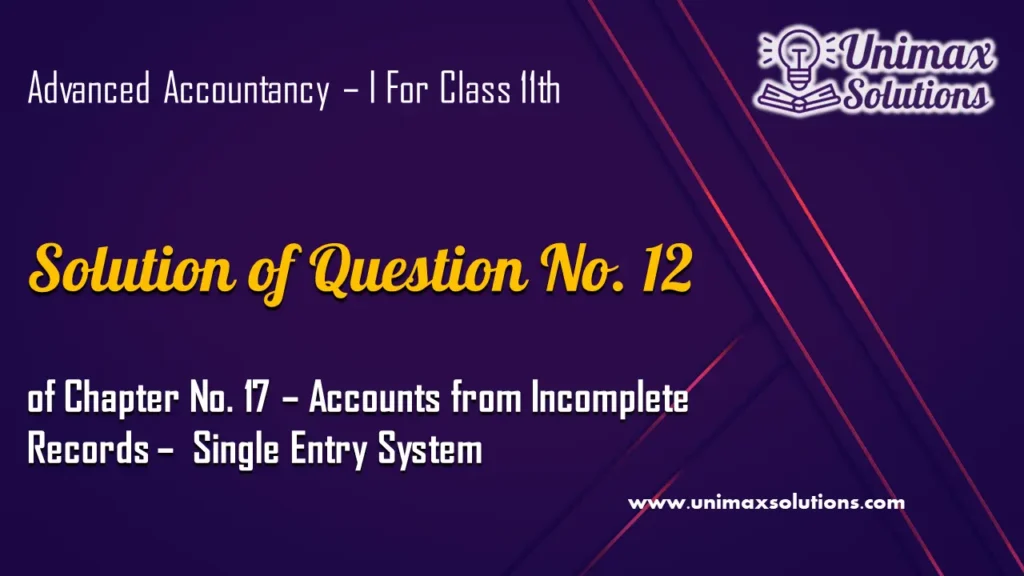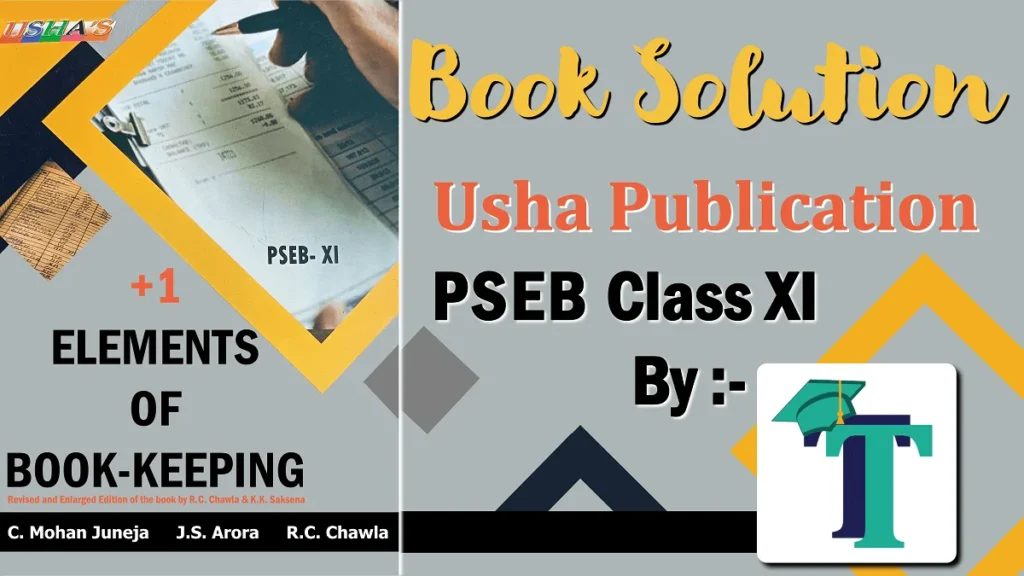
Advertisement
Question 12 Chapter No 17 – Class 11 Unimax
Nitin keeps incomplete records. The statement of Affairs of her business as at 1st April,2019 was as follows:
| Liabilities | Amount | Assets | Amount |
| Creditors | 20,000 | Cash in hand | 6,000 |
| Capital | 1,00,000 | Cash at bank | 7,000 |
| Stock | 25,000 | ||
| Furniture | 12,000 | ||
| Plant & Machinery | 55,000 | ||
| 1,20,000 | 1,20,000 |
His position on 31st March, 2020 was:- cash in hand ₹ 6,000; cash at bank 12,000; B/R 12,000; debtors ₹ 35,000; stock ₹ 50,000; furniture ₹ 60,000; plant & Machinery ₹ 50,000 and creditors ₹ 60,000.
He withdrew during the year ₹ 30,000, out of which he spent ₹ 20,000 for purchasing a scooter for the business.
Calculate his net profit for the year after the following adjustments and prepare a final statement of Affairs as at 31st March, 2020:
(1) Depreciation furniture and scooter @ 10%.
(2) 5% of the debtors are doubtful and ₹ 2,000 are absolutely bad.
(3) Make a provision of % on bills receivable also.
The solution of Question 12 Chapter No 17 – Class 11 Unimax
Statement of Affairs
As at 31 March, 2020(Before adjustments)
| Liabilities | Amount | Assets | Amount |
| Creditors | 60,000 | Cash in hand | 6,000 |
| Capital (Balance figure) | 1,84,000 | Cash at bank | 12,000 |
| Bills receivable | 12,000 | ||
| Debtors | 35,000 | ||
| Stock | 50,000 | ||
| Furniture | 60,000 | ||
| Scooter | 20,000 | ||
| Plant & Machinery | 50,000 | ||
| 2,45,000 | 2,45,000 |
Statement of Profit & Loss
For the year ended 31st March, 2020
| Particulars | ₹ | |
| Closing Capital as on 31st March, 2020 | 1,85,000 | |
| Add: Drawings during the year (30,000-20,000) | 10,000 | |
| 1,95,000 | ||
| Less: Opening capital as on 1st April,2019 | 1,00,000 | |
| Profit before adjustments | 95,000 | |
| Less: Depreciation on Furniture | 6,000 | |
| Deprecation on Scooter | 2,000 | |
| Bad debts | 2,000 | |
| Provision for doubtful debts 5% on 33,000 | ||
| (debtors 35,000-bad debts 2,000) | 1,650 | |
| Provision on B/R (5% on 12,000) | 600 | 12,250 |
| Net profit | 82,750 | |
Final Statement of Affairs
As at 31 March, 2020(After adjustments)
Advertisement
| Liabilities | Amount | Assets | Amount | ||
| Creditors | 60,000 | Cash in hand | 6,000 | ||
| Opening Capital | 1,00,000 | Cash at bank | 12,000 | ||
| Add: Net Profit | 82,750 | Bills receivable | 12,000 | ||
| Less: Drawings | 10,000 | 1,72,750 | Less: Provision at 5% | 600 | 11,400 |
| Debtors | 35,000 | ||||
| Less: Bad debts | 2,000 | ||||
| Less: Provision for doubtful debts | 1,650 | 31,350 | |||
| Stock | 50,000 | ||||
| Furniture | 60,000 | ||||
| Less: Depreciation | 6,000 | 54,000 | |||
| Scooter | 20,000 | ||||
| Less: Depreciation | 2,000 | 18,000 | |||
| Plant & Machinery | 50,000 | ||||
| 2,32,750 | 2,32,750 | ||||
End of Solution
Check Out the Solution of all questions for this chapter:
The solutions to all questions of Chapter 17 – Accounts from Incomplete Records – Single Entry System Unimax – Class 11 are shown as follows, click on the image of the question to get the solution.
Question 3 Chapter No 17 – Class 11 Unimax
Advertisement
Question 8 Chapter No 17 – Class 11 Unimax
Advertisement
1. Comprehensive Solutions for All Chapters of Advanced Accountancy I Class 11 by Unimax
UnimaxSolutions.in offers a comprehensive solution for students studying Advanced Accountancy I Part 1 in Class 11. With their meticulously curated study material, students can access comprehensive solutions to all the questions included within each chapter. By selecting the chapter name from the study material, students can easily navigate through the topics and find detailed explanations and step-by-step solutions to the problems presented in that section. Whether it’s understanding complex accounting concepts, mastering calculation techniques, or analyzing financial statements, Unimax provides a valuable resource to aid students in their learning journey. With these comprehensive solutions at their disposal, students can enhance their understanding, clarify doubts, and improve their problem-solving skills in Advanced Accountancy, ensuring they are well-prepared for their Class 11 examinations.
- Chapter No. 1 – Introduction of Accounting
- Chapter No. 2 – Theory Base of Accounting
- Chapter No. 3 – Vouchers and Transactions
- Chapter No. 4 – Journal
- Chapter No. 5 – Goods and Services Tax (GST): An Introduction
- Chapter No. 6 – Ledger
- Chapter No. 7 – Special Purpose Book – Cash Book
- Chapter No. 8 – Other Subsidiary Books
- Chapter No. 9 – Trial Balance
- Chapter No. 10 – Rectification of Errors
- Chapter No. 11 – Depreciation
- Chapter No. 12 – Provision and Reserves
- Chapter No. 13 – Bank Reconciliation Statement
- Chapter No. 14 – Bills of Exchange
- Chapter No. 15 – Financial Statements (Without Adjustments)
- Chapter No. 16 – Financial Statements (With Adjustments)
- Chapter No. 17 – Accounts from Incomplete Records – Single Entry System
2. Punjab School Education Board (PSEB) Solutions of Usha Publication.
If you’re a student enrolled in the Punjab School Education Board Class 11, it’s essential to explore a wide range of books to cover the syllabus thoroughly. While the prescribed textbooks are undoubtedly valuable, supplementing your studies with additional resources can enhance your understanding and knowledge. Consider checking out other books that align with the curriculum, offering different perspectives and insights on the subjects you’re studying. These supplementary materials can provide you with alternative explanations, practice questions, and examples that may aid in clarifying complex concepts. Moreover, exploring diverse sources can expose you to a variety of writing styles and viewpoints, fostering a broader understanding of the subjects. So, seize the opportunity to expand your learning by delving into other books that can complement your studies and contribute to your academic growth.
Advertisement

